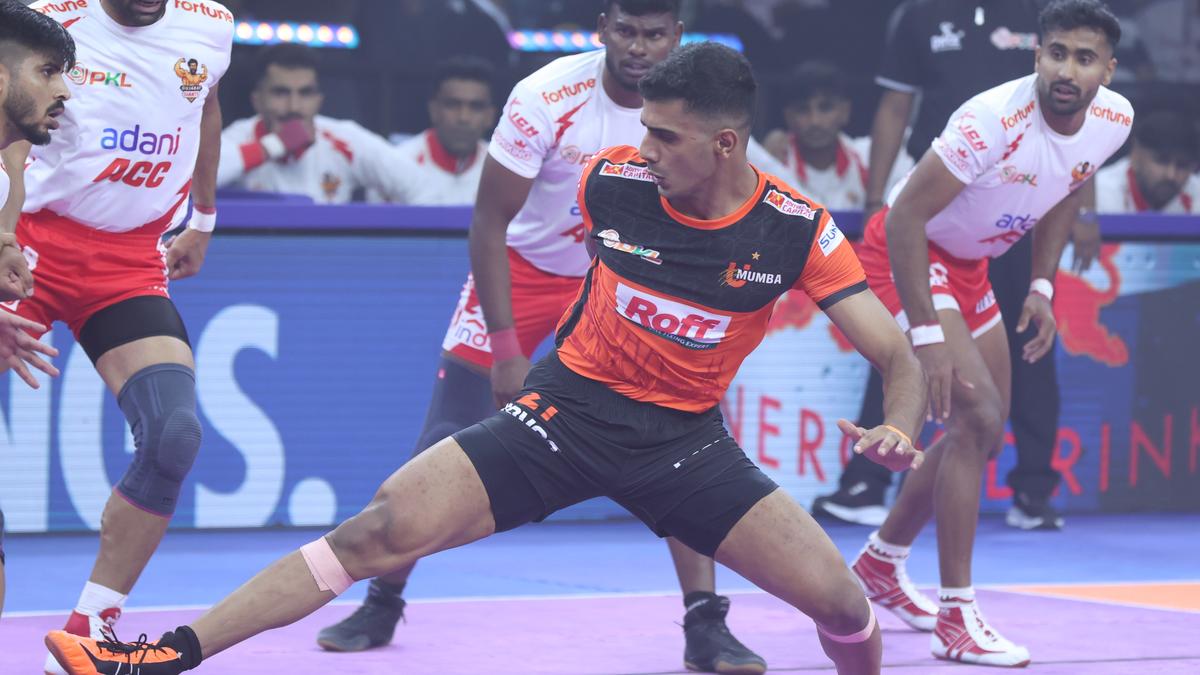PKL’s Bazball-esque tiebreaker shows promise amidst teething issues on opening weekend
Three key changes to the playing conditions have been in the spotlight in the Pro Kabaddi League’s 12th edition. The most interesting of them was the introduction of tiebreakers in the league stage.
The idea was to push teams to fight for a win rather than settle for draws. Sounds a lot like England’s Bazball, doesn’t it?
With great potential to entertain, fans and players waited with bated breath to see how the tiebreaks would play out. The league presented the chance on the opening day in Visakhapatnam, with Bengaluru Bulls and Puneri Paltan finishing on level terms at the end of regulation time. However, the tiebreaker itself began on chaotic terms.
Ironing out the creases
Coaches and players went back and forth with the lineup to be presented for the tiebreaker, while match officials and other league personnel at the Viswanadh Sports Club scrambled to get things in order. That resulted in a delay of close to 15 minutes before the tiebreaker could actually begin.
Paltan eventually emerged victorious 6-4, but the organisers had a bigger problem—ironing out the creases of their latest invention.
“We were working on creating a mechanism to figure out the flow of the tiebreak. There was a delay because we didn’t receive the lineup on time from the coach. It took three minutes to collect the lineup from the coach himself,” PKL’s technical director Ejjapureddi Prasad Rao told Sportstar.
“From both coaches, we take the lineups, go to the control room, and type it out, which is when the world will get to see it on screen. There was definitely some confusion there, and so we decided to sit on this aspect.”
Less than 24 hours later, PKL threw up another tie – between Gujarat Giants and U Mumba – to test if the debrief from day one had worked. The difference was there for all to see. In less than seven minutes, the lineups were set and players took to the mat to break the deadlock.
So, what happened overnight to reduce the time deficit by more than half?
“To speed things up, we’ve eliminated the routing through the control room. Coaches will now give pre-decided lists before the game begins. If a tiebreak comes about, we allow the coach time to confirm this list. This is to account for injuries, particularly,” Rao explained.
The human variable
Ahead of the league, referees and match officials were engaged in a fortnight-long training camp in Hyderabad, where the conduct of tiebreaks took on importance. But simulations can only prepare you so much for actual match conditions.
“No one can prepare anyone involved for match situations. We are dealing with two coaches – one who is happy the game is into a tiebreaker, and another who is unhappy because he’s lost a winning position to now deal with the tiebreaker. Officials have to wait. We can’t time them out and give technical points. All of this has been considered.”
Anupam Goswami, Business Head of Mashal and League Chairman – PKL, believes competition and content need to go hand-in-hand for leagues like the PKL.
“The issue with the delay on day one is that there was a pause in live action. We could only show highlights for a bit. It will definitely affect audiences in-stadia and impact broadcast viewership. Our team is clear that we shouldn’t pursue efficiency for efficiency’s sake. The success of the tiebreaker is when the technical director and the teams can go through it with clinical precision. It will give kabaddi a sense of choreography,” he told Sportstar.
“Today (Saturday) we were better. Players, coaches are all in a huddle, and there’s a lot of chatting going on. We can’t expect clarity of thought there. So, many opinions will be swirling around. We’ve decided to take the captain and coach separately and give them 90-odd seconds to reconfirm the lineup,” he said.
Wider appeal
Goswami admits that the league-stage tiebreak is still nascent and will only get smoother and more popular as the games go on.
“We have two tiebreaks in two days. In a 60-day league, I expect at least 15 tiebreakers. I promise you, next season, you’ll see a tiebreak specialist sitting in the dugouts who will strategise and monitor what’s happening. I believe this will be adopted by the wider world of kabaddi. Between a sport that has an outcome in every match and one where things are a bit confusing, there is a clear choice.”
Published on Aug 31, 2025


